(完整版)中考反义疑问句详解及练习和答案
反义疑问句详细讲解及习题及答案
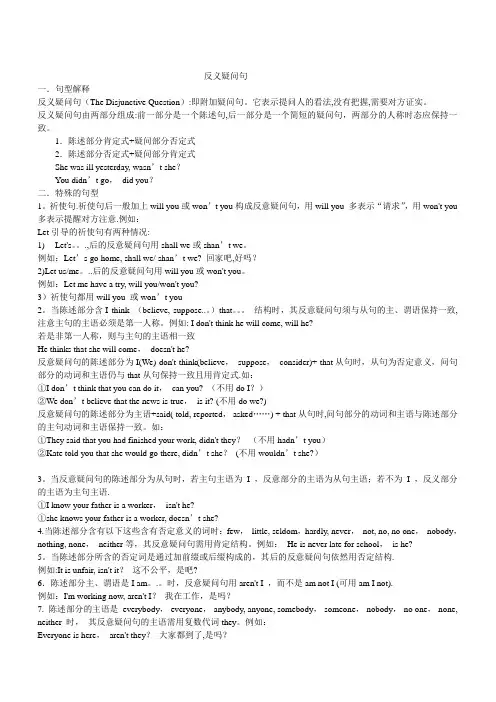
反义疑问句一.句型解释反义疑问句(The Disjunctive Question):即附加疑问句。
它表示提问人的看法,没有把握,需要对方证实。
反义疑问句由两部分组成:前一部分是一个陈述句,后一部分是一个简短的疑问句,两部分的人称时态应保持一致。
1.陈述部分肯定式+疑问部分否定式2.陈述部分否定式+疑问部分肯定式She was ill yesterday, wasn’t she?You didn’t go,did you?二.特殊的句型1。
祈使句.祈使句后一般加上will you或won’t you构成反意疑问句,用will you 多表示“请求”,用won't you 多表示提醒对方注意.例如:Let引导的祈使句有两种情况:1) Let's。
.,后的反意疑问句用shall we或shan’t we。
例如:Let’s go home, shall we/ shan’t we? 回家吧,好吗?2)Let us/me。
..后的反意疑问句用will you或won't you。
例如:Let me have a try, will you/won't you?3)祈使句都用will you 或won’t you2。
当陈述部分含I think (believe, suppose..。
)that。
结构时,其反意疑问句须与从句的主、谓语保持一致,注意主句的主语必须是第一人称。
例如: I don't think he will come, will he?若是非第一人称,则与主句的主语相一致He thinks that she will come,doesn't he?反意疑问句的陈述部分为I(We) don't think(believe,suppose,consider)+ that从句时,从句为否定意义,问句部分的动词和主语仍与that从句保持一致且用肯定式.如:①I don’t think that you can do it,can you? (不用do I?)②We don’t believe that the news is true,is it? (不用do we?)反意疑问句的陈述部分为主语+said( told, reported,asked……) + that从句时,问句部分的动词和主语与陈述部分的主句动词和主语保持一致。
反义疑问句详细讲解及习题及答案
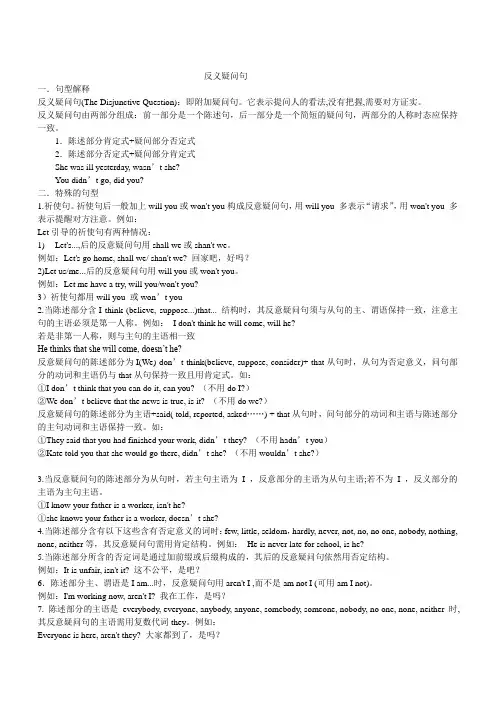
反义疑问句一.句型解释反义疑问句(The Disjunctive Question):即附加疑问句。
它表示提问人的看法,没有把握,需要对方证实。
反义疑问句由两部分组成:前一部分是一个陈述句,后一部分是一个简短的疑问句,两部分的人称时态应保持一致。
1.陈述部分肯定式+疑问部分否定式2.陈述部分否定式+疑问部分肯定式She was ill yesterday, wasn’t she?You didn’t go, did you?二.特殊的句型1.祈使句。
祈使句后一般加上will you或won't you构成反意疑问句,用will you 多表示“请求”,用won't you 多表示提醒对方注意。
例如:Let引导的祈使句有两种情况:1) Let's...,后的反意疑问句用shall we或shan't we。
例如:Let's go home, shall we/ shan't we? 回家吧,好吗?2)Let us/me...后的反意疑问句用will you或won't you。
例如:Let me have a try, will you/won't you?3)祈使句都用will you 或won’t you2.当陈述部分含I think (believe, suppose...)that... 结构时,其反意疑问句须与从句的主、谓语保持一致,注意主句的主语必须是第一人称。
例如:I don't think he will come, will he?若是非第一人称,则与主句的主语相一致He thinks that she will come, doesn’t he?反意疑问句的陈述部分为I(We) don’t think(believe, suppose, consider)+ that从句时,从句为否定意义,问句部分的动词和主语仍与that从句保持一致且用肯定式。
反义疑问句的讲解及练习(含答案)
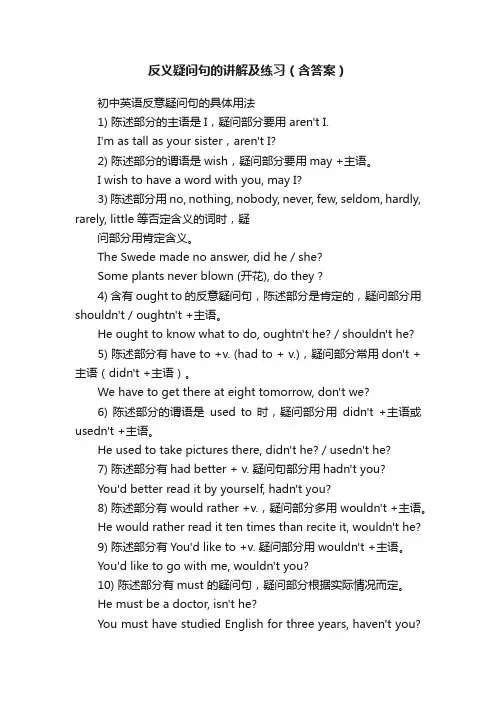
反义疑问句的讲解及练习(含答案)初中英语反意疑问句的具体用法1) 陈述部分的主语是I,疑问部分要用 aren't I.I'm as tall as your sister,aren't I?2) 陈述部分的谓语是wish,疑问部分要用may +主语。
I wish to have a word with you, may I?3) 陈述部分用 no, nothing, nobody, never, few, seldom, hardly, rarely, little等否定含义的词时,疑问部分用肯定含义。
The Swede made no answer, did he / she?Some plants never blown (开花), do they ?4) 含有ought to 的反意疑问句,陈述部分是肯定的,疑问部分用shouldn't / oughtn't +主语。
He ought to know what to do, oughtn't he? / shouldn't he?5) 陈述部分有have to +v. (had to + v.),疑问部分常用don't +主语(didn't +主语)。
We have to get there at eight tomorrow, don't we?6) 陈述部分的谓语是used to 时,疑问部分用didn't +主语或usedn't +主语。
He used to take pictures there, didn't he? / usedn't he?7) 陈述部分有had better + v. 疑问句部分用hadn't you?You'd better read it by yourself, hadn't you?8) 陈述部分有would rather +v.,疑问部分多用 wouldn't +主语。
初中英语反义疑问句讲解-练习及答案
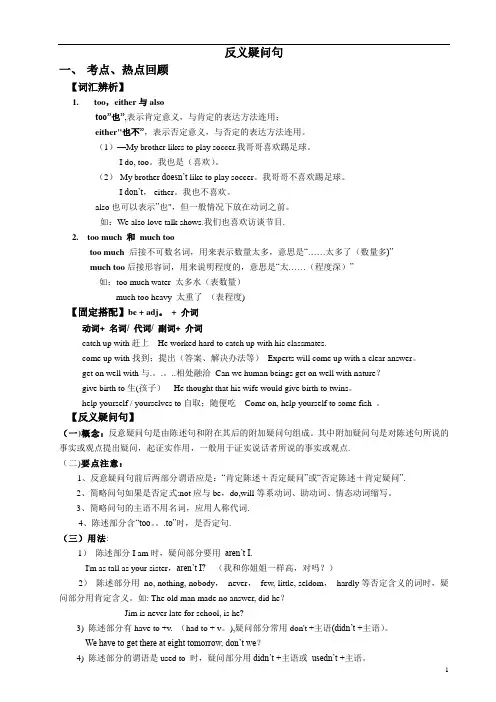
反义疑问句一、考点、热点回顾【词汇辨析】1.too,either与alsotoo”也”,表示肯定意义,与肯定的表达方法连用;either"也不”,表示否定意义,与否定的表达方法连用。
(1)—My brother likes to play soccer.我哥哥喜欢踢足球。
-I do, too。
我也是(喜欢)。
(2)-My brother doesn’t like to play soccer。
我哥哥不喜欢踢足球。
-I don’t, either。
我也不喜欢。
also也可以表示”也",但一般情况下放在动词之前。
如:We also love talk shows.我们也喜欢访谈节目.2. too much 和much tootoo much 后接不可数名词,用来表示数量太多,意思是“……太多了(数量多)”much too后接形容词,用来说明程度的,意思是“太……(程度深)”如:too much water 太多水(表数量)much too heavy 太重了(表程度)【固定搭配】be + adj。
+ 介词动词+ 名词/ 代词/ 副词+ 介词catch up with赶上He worked hard to catch up with his classmates.come up with找到;提出(答案、解决办法等)Experts will come up with a clear answer。
get on well with与.。
.。
..相处融洽Can we human beings get on well with nature?give birth to生(孩子)He thought that his wife would give birth to twins。
help yourself / yourselves to自取;随便吃Come on, help yourself to some fish 。
(完整版)中考反义疑问句详解及练习和答案
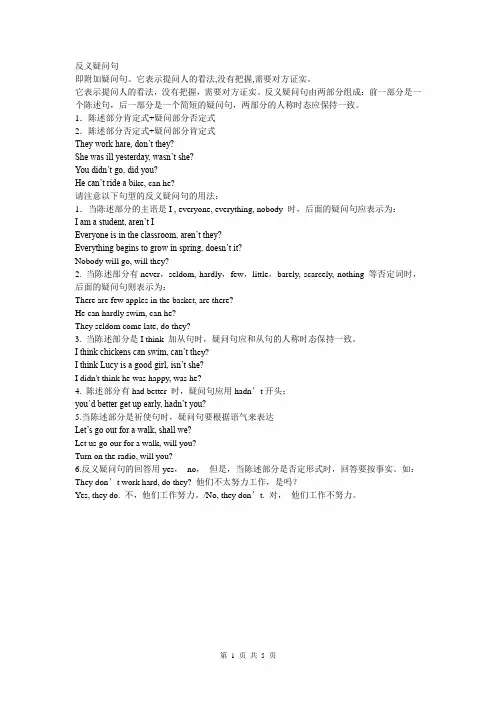
即附加疑问句。
它表示提问人的看法,没有把握,需要对方证实。
它表示提问人的看法,没有把握,需要对方证实。
反义疑问句由两部分组成:前一部分是一个陈述句,后一部分是一个简短的疑问句,两部分的人称时态应保持一致。
1.陈述部分肯定式+疑问部分否定式2.陈述部分否定式+疑问部分肯定式They work hare, don’t they?She was ill yesterday, wasn’t she?You didn’t go, did you?He can’t ride a b ike, can he?请注意以下句型的反义疑问句的用法:1.当陈述部分的主语是I , everyone, everything, nobody 时,后面的疑问句应表示为:I am a student, aren’t IEveryone is in the classroom, aren’t they?Everything begins to grow in spring, doesn’t it?Nobody will go, will they?2. 当陈述部分有never,seldom, hardly,few,little,barely, scarcely, nothing 等否定词时,后面的疑问句则表示为:There are few apples in the basket, are there?He can hardly swim, can he?They seldom come late, do they?3. 当陈述部分是I think 加从句时,疑问句应和从句的人称时态保持一致。
I think chickens can swim, can’t th ey?I think Lucy is a good girl, isn’t she?I didn't think he was happy, was he?4. 陈述部分有had better 时,疑问句应用hadn’t开头:you’d better get up early, hadn’t you?5.当陈述部分是祈使句时,疑问句要根据语气来表达Let’s go out for a walk, shall we?Let us go our for a walk, will you?Turn on the radio, will you?6.反义疑问句的回答用yes,no,但是,当陈述部分是否定形式时,回答要按事实。
初三英语反义疑问句试题答案及解析
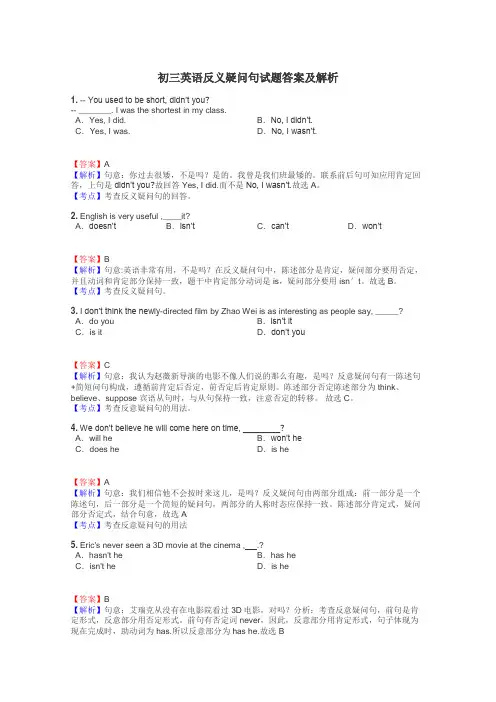
初三英语反义疑问句试题答案及解析1. -- You used to be short, didn’t you?-- _______. I was the shortest in my class.A.Yes, I did.B.No, I didn’t.C.Yes, I was.D.No, I wasn’t.【答案】A【解析】句意:你过去很矮,不是吗?是的。
我曾是我们班最矮的。
联系前后句可知应用肯定回答,上句是didn’t you?故回答Yes, I did.而不是No, I wasn’t.故选A。
【考点】考查反义疑问句的回答。
2. English is very useful ,____it?A.doesn’t B.isn’t C.can’t D.won’t【答案】B【解析】句意:英语非常有用,不是吗?在反义疑问句中,陈述部分是肯定,疑问部分要用否定,并且动词和肯定部分保持一致,题干中肯定部分动词是is,疑问部分要用isn't。
故选B。
【考点】考查反义疑问句。
3.I don’t think the newly-directed film by Zhao Wei is as interesting as people say, _____? A.do you B.isn’t itC.is it D.don’t you【答案】C【解析】句意:我认为赵薇新导演的电影不像人们说的那么有趣,是吗?反意疑问句有一陈述句+简短问句构成,遵循前肯定后否定,前否定后肯定原则。
陈述部分否定陈述部分为think、believe、suppose 宾语从句时,与从句保持一致,注意否定的转移。
故选C。
【考点】考查反意疑问句的用法。
4.We don’t believe he will come here on time, ________?A.will he B.won’t heC.does he D.is he【答案】A【解析】句意:我们相信他不会按时来这儿,是吗?反义疑问句由两部分组成:前一部分是一个陈述句,后一部分是一个简短的疑问句,两部分的人称时态应保持一致。
(完整)反义疑问句讲解和练习(答案)
反意疑问句一、英文中的反意疑问句。
1、什么是反意疑问句英语中,反意疑问句是由陈述句和附在其后的附加疑问句组成。
其中附加疑问句是对陈述句所说的事实或观点提出疑问,起证实作用,一般用于证实说话者所说的事实或观点.翻译为“是吗”2。
反意疑问句的回答,回答时,如果情况属实,用Yes加上反问句的倒装肯定句;若果情况不属实,则用No 加上反问句的倒装否定句。
例如You were moved by your students,weren’t you?情况属实:Yes, I were.情况不属实:No, I weren’t。
二、反意疑问句中问句部分的动词与陈述部分的动词在语气上成相反的对应关系,即:肯定+否定?否定+肯定?如:①You can't do it, can you?你不能做它,是吗?②They are very late for the meeting, aren’t they?他们开会迟到了,是吗?三.当陈述句中含有be动词,助动词,或是情态动词时,反问句部分由这些词加上主语人称代词构成。
She is a lovely girl,isn’t she?她是一个可爱的女孩,是吗?He will go home, __won’t__ __he__?他要回家了,是吗?She doesn’t l ike to eat popcorn, __does__ _she___?她不喜欢吃爆米花,是吗?The baby won't sleep early, will it?小宝宝睡得不早,是吗?注意:He has supper at home every day,doesn’t’t he? (不能用hasn’t he?)他每天在家吃晚饭,是吗?They have known the matter,haven’t they? (不能用don’t they?)他们已经知道那事情了,是吗?小试牛刀:It’s very hot today, _______________ ?He can speak Chinese, _______________ ?It _______________ a good day for swimming, is it?Tom has been to Singapore , _______________ ?She do esn’t like climbing hills , _______________ ?四.当陈述句中只含有行为动词时,若动词加了s,就用does, 若动词为原形,就用do,动词为过去式,则用did,例如:You cleaned your house last week, _didn’t___ __you__?你上周打扫了你的房间,是吗?Your father plays the computer very well, __doesn’t__ ___he _?你父亲电脑技术很好,是吗?They look so happy today, _don’t ___ _they___?你今天看起来很高兴,是吗?小试牛刀: Meimei studies in a middle school, _______________ ?He loves cold weather , _______________ ?You finished the task yesterday, _______________ ?五.反意疑问句的陈述部分带有little, few, never, hardly, seldom,nobody, nothing,barely, scarcely等否定意义的词时,问句部分用肯定式.如:①She never tells a lie, does she?(不用doesn’t she?)她从不说谎,是吗?②He was seldom late, was he?(不用wasn’t he?) 他几乎不迟到,是吗?小试牛刀:Few students can answer the question, _______________ ?He can hardly finish his homework, _______________ ?六、反意疑问句的陈述部分为I am……时,问句部分习惯上用aren’t I?表示.如:I am a very honest man, aren’t I? 我是个很诚实的人,是吗?小试牛刀:I’m in Class 3,Grade 2, _______________ ?I’m ten years old, _______________ ?七.陈述部分的主语为不定代词something, anything, nothing, everything时,问句部分的主语用it。
(完整版)反义疑问句详细讲解及习题及答案
反义疑问句一.句型解释反义疑问句(The Disjunctive Question):即附加疑问句。
它表示提问人的看法,没有把握,需要对方证实。
反义疑问句由两部分组成:前一部分是一个陈述句,后一部分是一个简短的疑问句,两部分的人称时态应保持一致。
1.陈述部分肯定式+疑问部分否定式2.陈述部分否定式+疑问部分肯定式She was ill yesterday, wasn’t she?You didn’t go, did you?二.特殊的句型1.祈使句。
祈使句后一般加上will you或won't you构成反意疑问句,用will you 多表示“请求”,用won't you 多表示提醒对方注意。
例如:Let引导的祈使句有两种情况:1) Let's...,后的反意疑问句用shall we或shan't we。
例如:Let's go home, shall we/ shan't we? 回家吧,好吗?2)Let us/me...后的反意疑问句用will you或won't you。
例如:Let me have a try, will you/won't you?3)祈使句都用will you 或won’t you2.当陈述部分含I think (believe, suppose...)that... 结构时,其反意疑问句须与从句的主、谓语保持一致,注意主句的主语必须是第一人称。
例如:I don't think he will come, will he?若是非第一人称,则与主句的主语相一致He thinks that she will come, doesn’t he?反意疑问句的陈述部分为I(We) don’t think(believe, suppose, consider)+ that从句时,从句为否定意义,问句部分的动词和主语仍与that从句保持一致且用肯定式。
反义疑问句详解+练习+答案
反义疑问句:反意疑问句由“陈述句+简略疑问句”两部分组成,第一部分提出一种看法,第二部分用来质疑或表示证实。
陈述部分与疑问部分的动词时态和动词性质应保持一致,而且肯定和否定形式彼此相反,即陈述部分为肯定式时,疑问部分用否定式,陈述部分为否定式时(前否后肯,前肯后否)疑问部分根据前面是否肯定/否定而定:He likes English,doesn’t he?他喜欢英语,是吗?He doesn’t like English,does he?他不喜欢英语,是吗?看一看:1.陈述句部分与附加疑问句部分意思相反:前肯后否、前否后肯。
如:Mary is a teacher,_isn’t she___?He didn't tell you the story,did he__?2.反意疑问句基本对应形式如下:(1)be动词对应be动词。
如:She is a policewoman,_isn’t she__?(2)情态动词对应情态动词。
如:He can drive the car,can’t he___?(3)行为动词对应助动词的相应形式。
这种助动词主要指帮助构成疑问句或否定句的do/does/did,以及它们的否定形式。
如:He slept for9hours yesterday,_didn’t he__?He didn't go to the park,__did he__?1.若陈述部分含有hardly,never,few,nothing,little,nobody,seldom 等否定词或半否定词,其疑问部分要用肯定式:He has few friends here,has he?他在这儿几乎没什么朋友,是吗?She said nothing,did she?她什么也没说,是不是?2.当陈述部分为为there be句型时,疑问部分仍用there作“主语”:例如:There was nothing in the room,was there?房间里什么也没有,是吗?3.当陈述部分的主语是复合不定代词时,若陈述部分的主语为somebody, someone,everyone,everybody,no one,nobody等复合不定代词,其反意疑问句的主语在正式文体中用he,在口语或非正式文体中通常用they例如:Nobody was late,were they?没有一个人迟到,是吗?4.当陈述部分的主语是something,anything,nothing,everything等复合不定代词时,其反意疑问句的主语要用it:例如:Everything is ready,isn’t it?一切都准备好了吗?5.当陈述部分是I’m…时,疑问部分通常用aren’t例如:I’m wrong,aren’t I?我错了,是吗?6.当陈述部分是I wish…时,疑问部分通常用may I例如:I wish to go with them,may I?我想同他们一起去,可以吗?认一认:几种特殊的反义疑问句1.基本原则:若陈述部分为祈使句,疑问部分通常用will you:Please help us,will you?请帮帮我们,好吗?Come with us,will you?同我们一起去,好吗?2.当祈使句为Let’s…时,疑问部分总是用shall weLet’s go there together,shall we?我们一起去,好吗?3.当祈使句为Let us…时,若表示请求,疑问部分用will you,若表示建议,疑问部分用shall we:Let us know your address,will you?请把你的地址告诉我们,好吗?Let us go swimming together,shall we?我们一起去游泳好吗?能力提升:完成下列反义疑问句1.He has a lot of work to do,___doesn’t______he___?2、Uncle Wang forgot to bring your bag,___didn’t______he___?3、There’re more than ten pandas on the hill,__isn’t___there__?4、Tom wants to get his TV set back,__doesn’t_____he___?5、It’s fine today,_isn’t___it__?6、Mary’s just come back from America,_hasn’t___she___?7、Danny bought some shampoo in the supermarket,___didn’t______he___?8、Nobody was looking for me,___was______he___?9、He needs our help,__doesn’t____he__?10.Let us stop to rest,__will_you_?。
(完整版)反义疑问句讲解及答案
反义疑问句一.句型解释反义疑问句(The Disjunctive Question):即附加疑问句。
它表示提问人的看法,没有把握,需要对方证实。
反义疑问句由两部分组成:前一部分是一个陈述句,后一部分是一个简短的疑问句,两部分的人称时态应保持一致。
1.陈述部分肯定式+疑问部分否定式2.陈述部分否定式+疑问部分肯定式She was ill yesterday, wasn’t she?You didn’t go, did you?二.特殊的句型1.祈使句。
祈使句后一般加上will you或won't you构成反意疑问句,用will you 多表示“请求”,用won't you 多表示提醒对方注意。
例如:Let引导的祈使句有两种情况:1) Let's...,后的反意疑问句用shall we或shan't we。
例如:Let's go home, shall we/ shan't we? 回家吧,好吗?2)Let us/me...后的反意疑问句用will you或won't you。
例如:Let me have a try, will you/won't you?3)祈使句都用will you 或won’t you2.当陈述部分含I think (believe, suppose...)that... 结构时,其反意疑问句须与从句的主、谓语保持一致,注意主句的主语必须是第一人称。
例如:I don't think he will come, will he?若是非第一人称,则与主句的主语相一致He thinks that she will come, doesn’t he?反意疑问句的陈述部分为I(We) don’t think(believe, suppose, consider)+ that从句时,从句为否定意义,问句部分的动词和主语仍与that从句保持一致且用肯定式。
- 1、下载文档前请自行甄别文档内容的完整性,平台不提供额外的编辑、内容补充、找答案等附加服务。
- 2、"仅部分预览"的文档,不可在线预览部分如存在完整性等问题,可反馈申请退款(可完整预览的文档不适用该条件!)。
- 3、如文档侵犯您的权益,请联系客服反馈,我们会尽快为您处理(人工客服工作时间:9:00-18:30)。
即附加疑问句。
它表示提问人的看法,没有把握,需要对方证实。
它表示提问人的看法,没有把握,需要对方证实。
反义疑问句由两部分组成:前一部分是一个陈述句,后一部分是一个简短的疑问句,两部分的人称时态应保持一致。
1.陈述部分肯定式+疑问部分否定式2.陈述部分否定式+疑问部分肯定式They work hare, don’t they?She was ill yesterday, wasn’t she?You didn’t go, did you?He can’t ride a b ike, can he?请注意以下句型的反义疑问句的用法:1.当陈述部分的主语是I , everyone, everything, nobody 时,后面的疑问句应表示为:I am a student, aren’t IEveryone is in the classroom, aren’t they?Everything begins to grow in spring, doesn’t it?Nobody will go, will they?2. 当陈述部分有never,seldom, hardly,few,little,barely, scarcely, nothing 等否定词时,后面的疑问句则表示为:There are few apples in the basket, are there?He can hardly swim, can he?They seldom come late, do they?3. 当陈述部分是I think 加从句时,疑问句应和从句的人称时态保持一致。
I think chickens can swim, can’t th ey?I think Lucy is a good girl, isn’t she?I didn't think he was happy, was he?4. 陈述部分有had better 时,疑问句应用hadn’t开头:you’d better get up early, hadn’t you?5.当陈述部分是祈使句时,疑问句要根据语气来表达Let’s go out for a walk, shall we?Let us go our for a walk, will you?Turn on the radio, will you?6.反义疑问句的回答用yes,no,但是,当陈述部分是否定形式时,回答要按事实。
如:They don’t work hard, do they? 他们不太努力工作,是吗?Yes, they do. 不,他们工作努力。
/No, they don’t. 对,他们工作不努力。
1、陈述部分的主语是I,疑问部分要用aren't I I'm as tall as your sister,aren't I2、陈述部分的谓语是wish,疑问部分要用may +主语。
I wish to have a word with you, may I3、陈述部分用no, nothing, nobody, never, few, seldom, hardly, rarely, little等否定含义的词时,疑问部分用肯定含义。
The Swede made no answer, did he / she Some plants never blown (开花), do they 4、含有ought to 的反意疑问句,陈述部分是肯定的,疑问部分用shouldn't / oughtn't +主语。
He ought to know what to do, oughtn't he / shouldn't he5、陈述部分有have to +v. (had to + v.),疑问部分常用don't +主语(didn't +主语)。
We have to get there at eight tomorrow, don't we6、陈述部分的谓语是used to 时,疑问部分用didn't +主语或usedn't +主语。
He used to take pictures there, didn't he / usedn't he7、陈述部分有had better + v. 疑问句部分用hadn't youYou'd better read it by yourself, hadn't you8、陈述部分有would rather +v.,疑问部分多用wouldn't +主语。
He would rather read it ten times than recite it, wouldn't he9、陈述部分有You'd like to +v. 疑问部分用wouldn't +主语。
You'd like to go with me, wouldn't you10、陈述部分有must 的疑问句,疑问部分根据实际情况而定。
He must be a doctor, isn't heYou must have studied English for three years, haven't you / didn't youHe must have finished it yesterday, didn't he11、感叹句中,疑问部分用be +主语。
What colours, aren't theyWhat a smell, isn't it12、陈述部分由neither… nor, either… or 连接的并列主语时,疑问部分根据其实际逻辑意义而定。
Neither you nor I am engineer, are we13、陈述部分主语是指示代词或不定代词everything, that, nothing, this, 疑问部分主语用it。
Everything is ready, isn't it14、陈述部分为主语从句或并列复合句,疑问部分有三种情况:a. 并列复合句疑问部分,谓语动词根据邻近从句的谓语而定。
Mr. Smith had been to Beijing for several times, he should have been in Chinanow, shouldn't heb. 带有定语从句,宾语从句的主从复合句,疑问部分谓语根据主句的谓语而定:He is not the man who gave us a talk, is heHe said he wanted to visit Japan, didn't hec. 上述部分主句谓语是think, believe, expect, suppose, imagine等引导的定语从句,疑问部分与宾语从句相对应构成反意疑问句。
I don't think he is bright, is heWe believe she can do it better, can't she15、陈述部分主语是不定代词everybody, anyone, somebody, nobody, no one等,疑问部分常用复数they,有时也用单数he。
Everyone knows the answer, don't they (does he )Nobody knows about it, do they (does he )16、带情态动词dare或need的反意疑问句,疑问部分常用need (dare ) +主语。
We need not do it again, need weHe dare not say so, dare you当dare, need 为实义动词时,疑问部分用助动词do + 主语。
She doesn't dare to go home alone, does she17、省去主语的祈使句的反意疑问句,疑问部分用will you。
Don't do that again, will youGo with me, will you / won't youLet's 开头的祈使句,后用shall weLet us 开头的祈使句,后用will youLet's go and listen to the music, shall weLet us wait for you in the reading-room, will you18、陈述部分是"there be"结构的,疑问部分用there省略主语代词。
There is something wrong with your watch, isn't thereThere will not be any trouble, will there19、否定前缀不能视为否定词,其反意疑问句仍用否定形式。
It is impossible, isn't itHe is not unkind to his classmates, is he20、must在表"推测"时,根据其推测的情况来确定反意疑问句。
He must be there now, isn't heIt must be going to rain tomorrow, won't it完成下列反意疑问句。
1.It’s very hot today, _______________ ?2. He can speak Chinese, _______________ ?3. Meimei studies in a middle school, _______________ ?4. He never gets up late , _______________ ?5. Don’t go out at night, _______________ ?6.He never loves cold weather , _______________ ?7. You finished the task yesterday, _______________ ?8.It _______________ a good day for swimming, is it?9.Tom has been to Singapore , _______________ ?10.The story is little interesting, _______________ ?11.Everything starts to grow in spring, _______________ ?12.He can hardly finish his homework, _______________ ?13.I’m in Class 3,Grade 2, _______________ ?14.Let’s go shopping , _______________ ?15.She doesn’t like climbing hills , _______________ ?16.I don’t think it is cold today, _______________ ?17. You think he is a good flight attendant, _______________ ?18.Nobody knows where she lives, _______________ ?19.Few students can answer the question, _______________ ?20.Mike likes English, _______________ ?21.That was a wonderful night, _______________ ?22.Your sister helped him, _______________ ?23.Tom is skating, _______________ ?24.You aren’t a teacher, _______________ ?25.They haven’t been to the Great Wall, _______________ ?26.You will join the soccer team, _______________ ?27.He likes neither apples nor pears, _______________ ?28.There are some good books for you, _______________ ?29.They have been there twice, _______________ ?30.Let’s do it now, _______________ ?31.You dislike this kind of gifts, _______________ ?32.Nothing is impossible, _______________ ?33.Everything is possible, _______________ ?34.He doesn’t go to school by bus, _______________ ?35.There is little milk left in the bottle, _______________ ?36.Let us clean the classroom by ourselves, _______________ ?37.He has studied here for about four years, _______________ ?38.You have never lost money before, _______________ ?39.Few of them hurt themselves in the accident last night, _______________ ?40.Peter could hardly see the words on the blackboard, _______________ ?41.She’s American, _______________ ?42.There will be a volleyball match in our school, _______________ ?43.Don’t smoke in the reading-room, _______________ ?44.I don’t think he is right, _______________ ?45.You must do your homework by yourself, _______________ ?46.You mustn’t touch the machine, _______________ ?47.He must be a worker, _______________ ?48.Someone looked for me yesterday, _______________ ?49.I’m a teacher, _______________ ?50.What a nice watch, _______________ ?51.I wish to use your ruler, _______________ ?52.I have to stay at home, _______________ ?53.You’d better wear warm clothes today, _______________ ?54.What he needs is his parents’ love, _______________ ?55.You’d like a cup of tea, _______________ ?56.Don’t be late again, _______________ ?57.Their prices are really low, _______________ ?58.Reading is good for you to learn English, _______________ ?59.No one knows about it, _______________ ?60.I think you should study hard, _______________ ?附加答案:1 . isn’t it 2. can’t he 3.doesn’t she 4.does he 5.will you6. does he7.didn’t you8. isn’t9.hasn’t he10.is it11.doesn’t it12.can he 13 .aren’t I 14.shall we 15.does she 16.is it 17.don’t you18does it 19. can they 20.doesn’t he 21.wasn’t it 22.didn’t she 23.isn’t he 24.are you 25.have they26.wont you 27.does he 28.aren’t there 29.haven’t they 30.shall we31.don’t you 32.is it 33.isn’t it 34.does he 35.is there36.will you 37.hasn’t he 38.have you 39.did they 40.could he41.isn’t she 42.won’t there 43.will you 44.is he 45.mustn’t you 46.must you 47.isn’t he 48.didn’t they 49.aren’t I 50.isn’t it51.may I 52.don’t I 53.hadn’t you 54.isn’t it 55.wouldn’t you 56.will you 57.aren’t they 58.isn’t it 59.do they 60.shouldn’t you。
